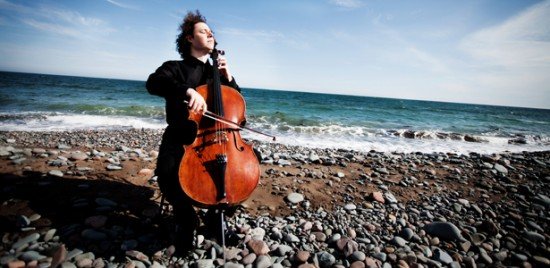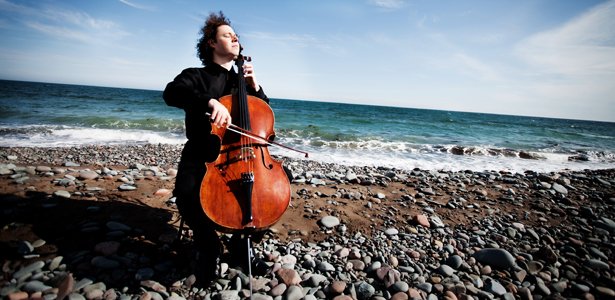By Josh Weiner
Matt Haimovitz and VOICE perform tonight at CenterStage

“If music be the food of love, play on,” William Shakespeare instructs us in Twelfth Night, and cello specialist Matt Haimovitz has complied. Classical music and Shakespeare represent two of his lifelong passions, and he found the common ground between them in a new composition entitled If Music Be the Food of Love, which he will perform at Reston Community Center’s CenterStage tonight at 8 p.m.
“The challenge with Shakespeare is that it’s so good and so musical all by itself, it doesn’t really need anything more to it,” Haimovitz says. “It has its own rhythm and own melody, in a way. On the other hand, words are words, and music can go to layers of understanding and human nature that even words can’t approach. Music overtakes words in some ways, giving them underlying meaning.”
Joining Haimovitz on this project is VOICE, a British a capella trio founded in 2006. The decision to include vocal accompaniment called for some immediate brainstorming on the four performers’ part.
“When you have three voices and a cello, there’s really no repertoire of music that would originally fit this combination,” Haimovitz says. “So we sort of had to start from scratch.”
The group ultimately held a worldwide competition in which classical music composers were called upon to craft pieces based on Shakespearean sonnets. Three works were chosen out of about 50 entries, and Haimovitz and his singers further incorporated elements of some of their favorite composers— including Leonard Cohen, Philip Glass and Hildegard of Bingen— into the final musical narrative. If Music Be the Food of Love will shift from one composer’s music to the next while loosely reconstructing a Shakespearean plotline.
Haimovitz has been playing the cello since his childhood and is accustomed to performing pieces by many of these classical composers. However, he says that this project marks the rare occasion for him to “work with words,” as he describes it, as well as to be accompanied onstage by singers rather than members of an orchestra.
“We’re sort of breaking down walls, to some degree,” he explains. “It’s become unexpectedly novel, combining a solo cello and three voices. We’ve become sort of a string quartet, the four of us.”
Haimovitz believes the work has paid off and that the tour will conclude on a strong note this evening.
“It’s been a wonderful collaboration,” he says. “We had such an amazing experience. It really gives you energy and hope.”





